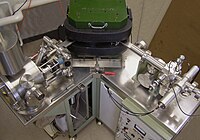
Errors associated with compound‐specific δ15N analysis of amino acids in preserved fish samples purified by high‐pressure liquid chromatography
Sign Up to like & getrecommendations! Published in 2020 at "Limnology and Oceanography: Methods"
DOI: 10.1002/lom3.10359
Abstract: Compound‐specific isotopic analysis of amino acids (CSIA‐AA) is increasingly used in ecological and biogeochemical studies tracking the origin and fate of nitrogen (N). Its advantages include the potential for resolving finer‐scale trophic dynamics than possible… read more here.
Keywords: analysis; compound specific; amino acids; analysis amino ... See more keywords

Evaluation of the suitability of the Waterloo Membrane Sampler for sample preconcentration before compound-specific isotope analysis
Sign Up to like & getrecommendations! Published in 2017 at "Environmental Technology and Innovation"
DOI: 10.1016/j.eti.2017.02.001
Abstract: Abstract Compound-specific isotope analysis (CSIA) has been used extensively for fingerprinting applications and for the evaluation of the degradation processes in organic contaminant studies in groundwater. Recently, the potential applications of CSIA in unsaturated and… read more here.
Keywords: unsaturated zone; specific isotope; isotope; waterloo membrane ... See more keywords

Impact of drill core contamination on compound-specific carbon and hydrogen isotopic signatures
Sign Up to like & getrecommendations! Published in 2019 at "Organic Geochemistry"
DOI: 10.1016/j.orggeochem.2019.01.003
Abstract: Abstract Compound-specific carbon and hydrogen isotope ratios are routinely measured on extractable organic matter to decipher biogeochemical processes and events in Earth history. To deliver accurate interpretations, it is paramount that isotopic values are derived… read more here.
Keywords: carbon hydrogen; isotopic; compound specific;

Compound-Specific Sulfur Isotope Analysis of Petroleum Gases.
Sign Up to like & getrecommendations! Published in 2017 at "Analytical chemistry"
DOI: 10.1021/acs.analchem.6b05131
Abstract: We describe a simple, sensitive, and robust method for sulfur isotope ratio (34S/32S) analysis of ppm-level organic sulfur compounds (OSCs) in the presence of percent-level H2S. The method uses a gas chromatograph (GC) coupled with… read more here.
Keywords: isotope; analysis; gas; method ... See more keywords

Assessment of Compound-Specific Fatty Acid δ13C and δ2H Values to Track Fish Mobility in a Small Sub-alpine Catchment
Sign Up to like & getrecommendations! Published in 2022 at "Environmental Science & Technology"
DOI: 10.1021/acs.est.2c02089
Abstract: Methods for identifying origin, movement, and foraging areas of animals are essential for understanding ecosystem connectivity, nutrient flows, and other ecological processes. Telemetric methods can provide detailed spatial coverage but are limited to a minimum… read more here.
Keywords: 2hfa 13cfa; site specificity; compound specific;

Characterization of Hexachlorocyclohexane Isomer Dehydrochlorination by LinA1 and LinA2 Using Multi-element Compound-Specific Stable Isotope Analysis.
Sign Up to like & getrecommendations! Published in 2022 at "Environmental science & technology"
DOI: 10.1021/acs.est.2c05334
Abstract: Dehydrochlorination is one of the main (thus far discovered) processes for aerobic microbial transformation of hexachlorocyclohexane (HCH) which is mainly catalyzed by LinA enzymes. In order to gain a better understanding of the reaction mechanisms,… read more here.
Keywords: element compound; specific stable; multi element; dehydrochlorination ... See more keywords

Tracing the Biotransformation of PCBs and PBDEs in Common Carp (Cyprinus carpio) Using Compound-Specific and Enantiomer-Specific Stable Carbon Isotope Analysis.
Sign Up to like & getrecommendations! Published in 2017 at "Environmental science & technology"
DOI: 10.1021/acs.est.6b05130
Abstract: Compound-specific and enantiomer-specific carbon isotope composition was investigated in terms of biotransformation of polychlorinated biphenyls (PCBs) and polybrominated diphenyl ethers (PBDEs) as well as atropisomers of chiral PCB congeners in fish by exposing common carp… read more here.
Keywords: carbon; carbon isotope; biotransformation; pcb ... See more keywords

Identification of Degradation Pathways of Chlorohydrocarbons in Saturated Low-Permeability Sediments Using Compound-Specific Isotope Analysis.
Sign Up to like & getrecommendations! Published in 2018 at "Environmental science & technology"
DOI: 10.1021/acs.est.8b01173
Abstract: This study aims to investigate whether compound-specific carbon isotope analysis (CSIA) can be used to differentiate the degradation pathways of chlorohydrocarbons in saturated low-permeability sediments. For that purpose, a site was selected, where a complex mixture… read more here.
Keywords: degradation; isotope analysis; degradation pathways; pathways chlorohydrocarbons ... See more keywords

In Situ Microbial Degradation of PBDEs in Sediments from an E-Waste Site as Revealed by Positive Matrix Factorization and Compound-Specific Stable Carbon Isotope Analysis.
Sign Up to like & getrecommendations! Published in 2019 at "Environmental science & technology"
DOI: 10.1021/acs.est.8b06110
Abstract: In the present study, positive matrix factorization (PMF) and compound-specific isotope analysis were used to investigate the in situ biodegradation of polybrominated diphenyl ethers (PBDEs) in sediment cores collected from a pond at an e-waste… read more here.
Keywords: positive matrix; isotope; biodegradation; site ... See more keywords

Origin of Xylitol in Chewing Gum: A Compound-Specific Isotope Technique for the Differentiation of Corn- and Wood-Based Xylitol by LC-IRMS.
Sign Up to like & getrecommendations! Published in 2018 at "Journal of agricultural and food chemistry"
DOI: 10.1021/acs.jafc.7b05212
Abstract: The sugar replacement compound xylitol has gained increasing attention because of its use in many commercial food products, dental-hygiene articles, and pharmaceuticals. It can be classified by the origin of the raw material used for… read more here.
Keywords: chewing gum; compound specific; xylitol; isotope ... See more keywords

Compound‐Specific Radiocarbon Analysis of (Sub‐)Antarctic Coastal Marine Sediments—Potential and Challenges for Chronologies
Sign Up to like & getrecommendations! Published in 2020 at "Paleoceanography and Paleoclimatology"
DOI: 10.1029/2020pa003890
Abstract: In Antarctic and Subantarctic environments, 14C‐based age determination is often challenging due to unknown reservoir effects, low organic carbon contents of sediments, and high contributions of petrogenic (14C‐free) carbon in ice marginal settings. In this… read more here.
Keywords: specific radiocarbon; compound specific; radiocarbon analysis; age ... See more keywords